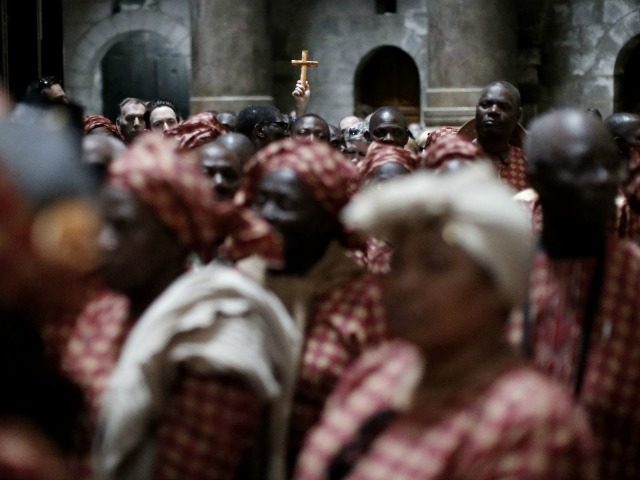Christians in predominantly Muslim northern Nigeria sent an open letter to President Donald Trump on Thursday urging the United States to help persecuted Christians defend themselves from jihadist attacks in the country, typically at the hand of the Fulani herdsman that populate north-central Nigeria.
Voice of Northern Christian Movement in Nigeria (VNCMN), a Christian advocacy group, argued that Christians have become a growing target of attacks since the election of President Muhammadu Buhari, himself a Fulani Muslim, in 2015. Buhari was re-elected for a second term this year.
Buhari’s government has repeatedly claimed it has ended a separate jihadist threat – the Islamic State affiliated group Boko Haram, operating in northeast Nigeria – though Nigerian Christians also refute this claim, citing waves of abductions and village raids in Borno and Adamawa states. Following Boko Haram attacks, Buhari officials now claim that those jihadists are not actually Boko Haram, but the “Islamic State -West Africa.” Boko Haram renamed itself “Islamic State West Africa Province” (ISWAP) in 2015, but now Buhari says that the two are separate groups.
Unlike Boko Haram, which has long claimed its goal the imposition of a Sunni sharia state in Nigeria and eradication of Western education, Fulani herdsman first began to engage in conflict with Christians because the latter were predominantly farmers and the herdsman wanted to use their land for their cattle. In recent years, however, the Fulani herdsman have gone on a campaign to eliminate Christians entirely, one that those affected have referred to as genocide. Fulani herdsman commonly target schools, churches, and private homes with no clear relation to farming, disproving the claims that their attacks are based merely on territorial disputes.
Last month, Fulani terrorists kidnapped 17 Christians during a church choir practice and attacked a Baptist church in Kaduna state, storming into the church and shooting the believers congregated. In a separate attack in late May, locals say Fulani terrorists burned down 20 Christian homes and killed 20 locals in the region.
By mid-2018, the Fulani had killed more people than Boko Haram that year. Some Fulani massacres have resulted in the deaths of hundreds of people.
VNCMN specifically complained that, under Buhari and Kaduna state Governor Nasiru Ahmed El-Rufai, Islamic radicals have been emboldened to persecute Christians. Rev. Kallamu Musa Ali Dikwa, the executive director of the group, accused Rufai of supporting Fulani herdsman attacks and endorsing the creation of an Islamic state within the country.
“In Kaduna State, he (El-Rufai) unilaterally proposed to create a purely Islamic emirate for the handful of Muslims in Kajuru town over large swathes of ancestral Adaraland,” the reverend wrote in the letter, which the group handed to the American embassy in the country, according to the country’s Guardian newspaper. “This, coupled with vindictive arrests and detention of any outspoken Adara citizen, has shattered any existing cordial relationship among the people in the area.”
“When he saw that the Fulani terrorists could not complete the work of cleansing the ethno-religious Southern Kaduna [of Christians], Governor El-Rufai took over from them, using the power of government on the people to take over Southern Kaduna communities for Islam and Fulani ethnic groups, abusing the power of his office,” the letter asserts.
VNCMN also accuses Rufai of giving violent Fulani Muslim groups “millions of Naira” to stop the attacks when the publicity became too negative for him.
“From the foregoing, it is clear that the focus of Governor El-Rufai and the Federal Government is pointing to the Islamic agenda, with a view to taking over all Christian settlements, villages, towns, districts, local governments and the entire state to the detriment of the Christians,” the letter concludes.
The Global Terrorism Index report found at the end of last year that the Fulani jihadists had killed nearly 1,700 people, mostly Christians, in 2018, six times the number of people killed by Boko Haram, according to Nigeria’s Pulse newspaper. The number marked a notable increase in killings since 2018.
Under Buhari, the Fulani jihadists and Boko Haram have killed over 3,000 people since Buhari took office. Buhari won re-election largely campaign against incumbent Christian President Goodluck Jonathan by accusing him of not doing enough to stop jihadist massacres and vowing a stern hand against violent Islamic supremacists. Buhari served a short stint as military dictator in 1985 and argued that his experience would allow him to bring stronger leadership to the Nigerian presidency.
Buhari’s government has infuriated Christians by offering Fulanis money to stop the killings and suggesting the establishment of a Fulani radio station, which many have expressed concerns would broadcast hate speech and create a similar situation to the events preceding the Rwandan genocide of 1994.
The United States Commission on International Religious Freedom (USCIRF), in its 2019 report, accused Buhari’s government of continuing to “tolerate violence and discrimination on the basis of religion or belief, and suppress[ing] the freedom to manifest religion or belief.”
“The Nigerian federal government failed to implement effective strategies to prevent or stop such violence or to hold perpetrators accountable. Boko Haram and the Islamic State of Iraq and Syria-West Africa (ISIS-WA) continued to perpetrate attacks against civilians and the military throughout the year, despite the government’s claims of progress in defeating them,” the report read. “In addition, members of the military and the civilian joint task force, a local vigilante group supporting official forces, were accused of human rights violations against civilians displaced by conflict.”

COMMENTS
Please let us know if you're having issues with commenting.